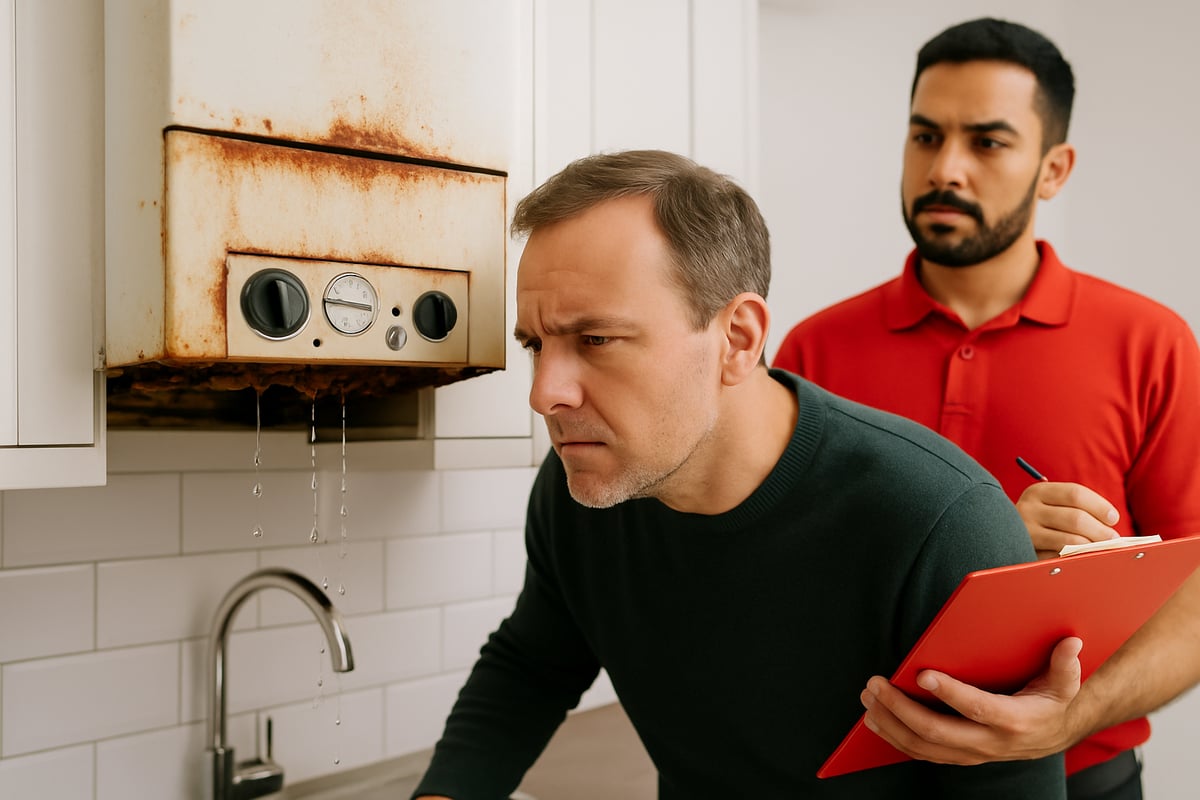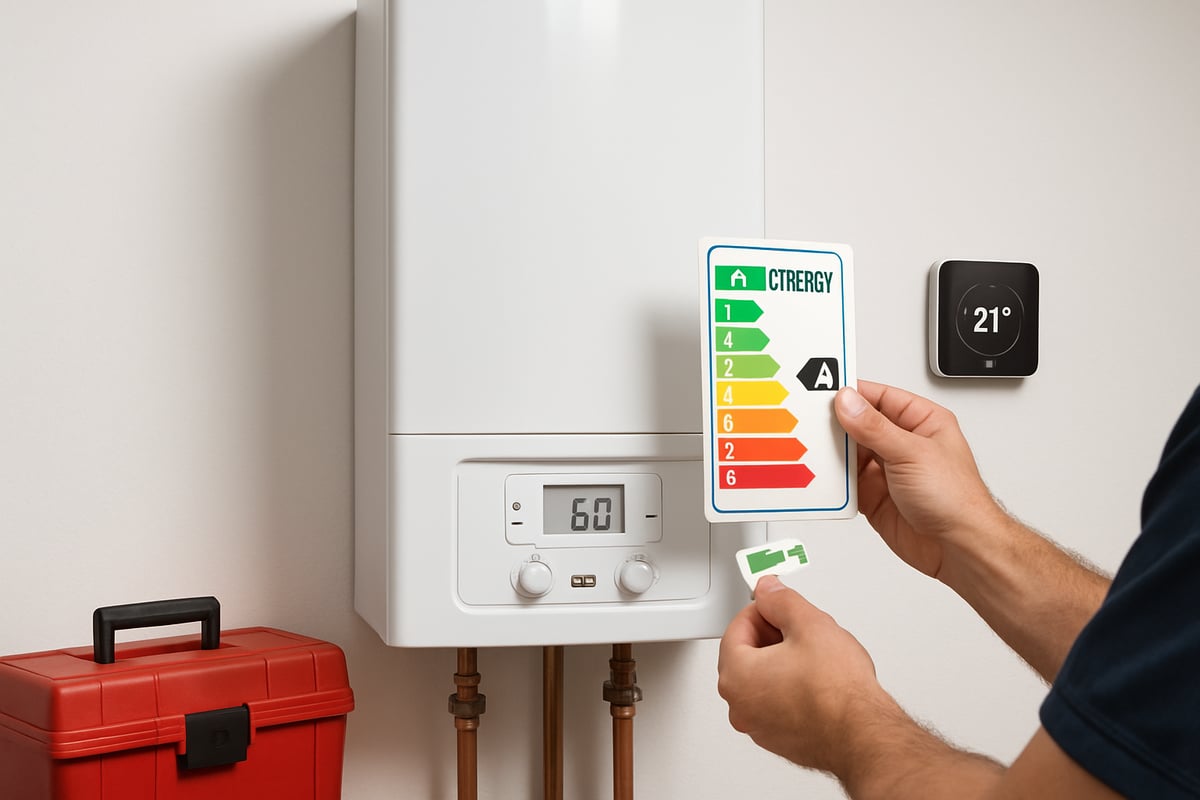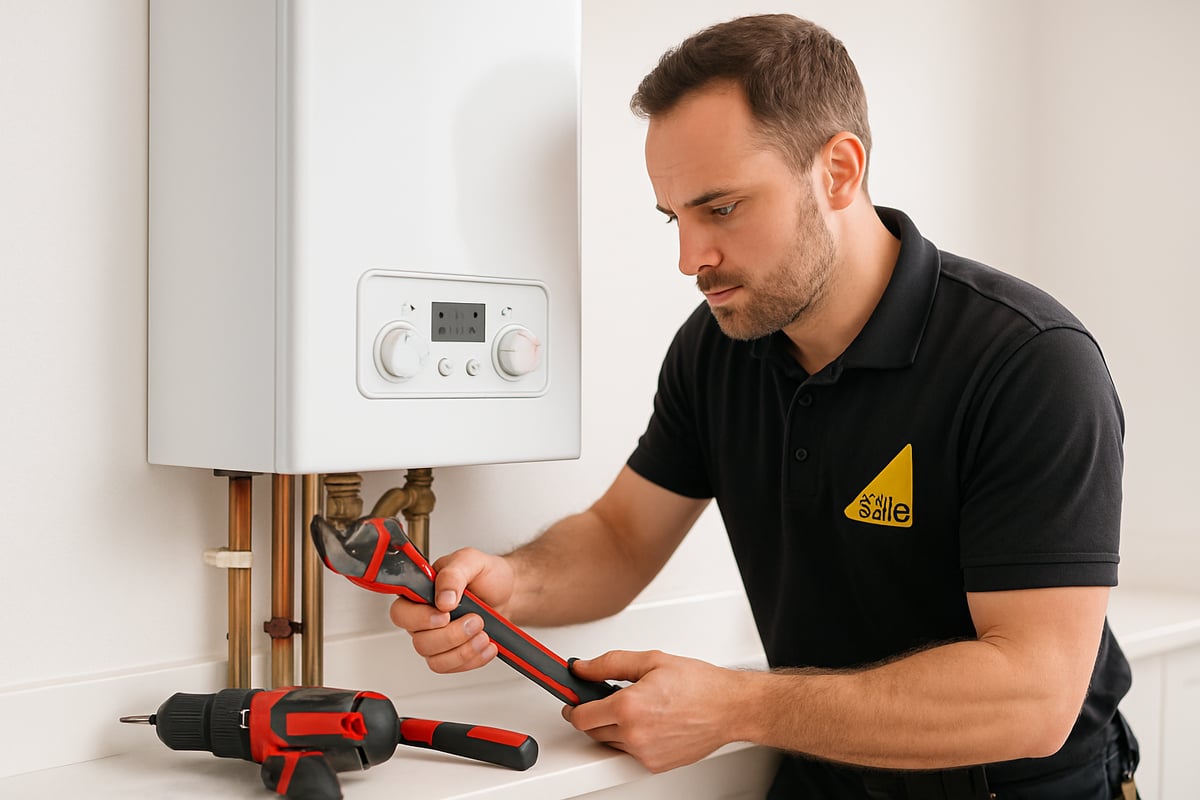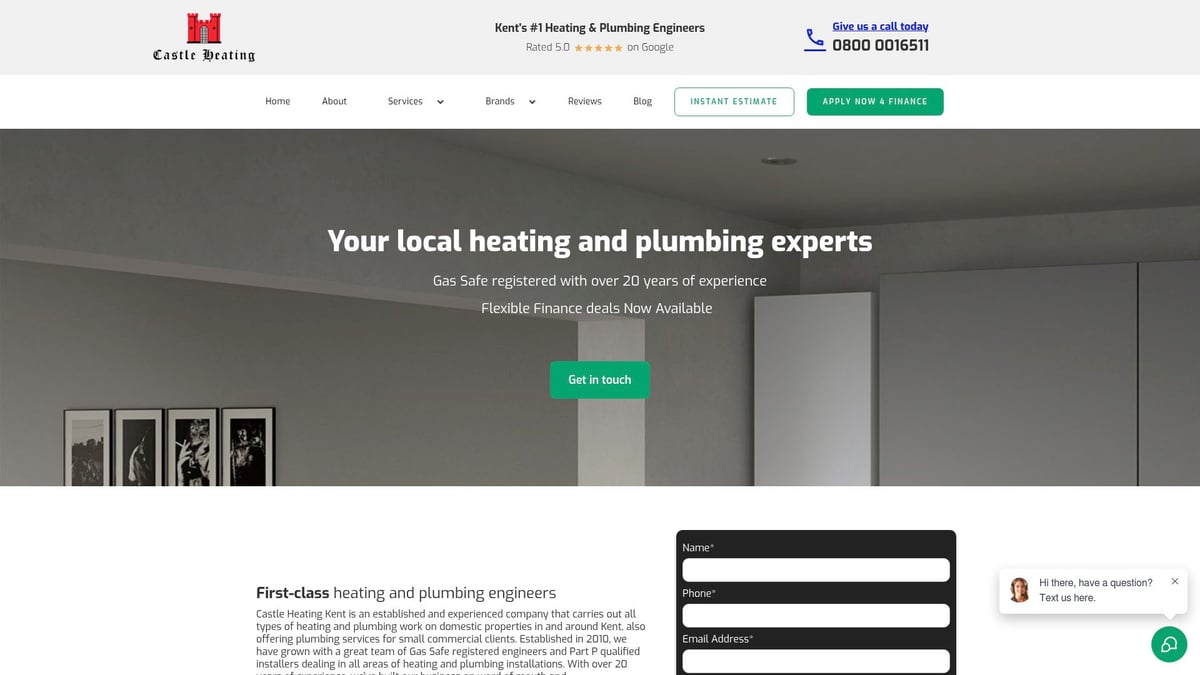Boiler Replacement Guide: Essential Steps for 2025
Facing a boiler replacement in 2025? With energy costs rising and new regulations on the horizon, there’s never been a more important time to take action. Upgrading your boiler can bring better efficiency, lower bills, and a warmer, more comfortable home.
This guide is your step-by-step companion for boiler replacement, tailored for UK homeowners. We’ll show you how to spot when your boiler needs replacing, explain the latest 2025 rules, and help you choose the right system for your home.
Discover how to save money, stay compliant, and enjoy total peace of mind. Ready to future-proof your heating? Let’s get started.
Recognising When to Replace Your Boiler
Knowing when to consider a boiler replacement can save you from unexpected breakdowns and rising bills. Many UK homeowners delay this decision, but acting early brings peace of mind and improved comfort. Here’s how to spot the signs and make the right choice for your home.

Common Signs Your Boiler Needs Replacing
It’s easy to overlook the first hints that your boiler is on its last legs. Watch out for frequent breakdowns, persistent leaks, or strange noises such as banging and gurgling. Low water pressure, irregular heating, and difficulty sourcing parts are also red flags.
Increased energy bills often signal that your system is wasting fuel. Remember, the average boiler lifespan is 10-15 years, according to Worcester Bosch. If you’re unsure, check out these signs you need a new boiler for a detailed list. Spotting these issues early makes boiler replacement a proactive, not reactive, decision.
The Impact of an Ageing Boiler on Home Comfort and Costs
An older boiler struggles to keep your home warm and your water hot, especially during cold snaps. As efficiency drops, your energy bills rise, making your system more expensive to run. The risk of sudden breakdowns increases, potentially leaving you without heating when you need it most.
Upgrading to a new boiler can save households with boilers over 15 years old more than £500 a year, according to BOXT. Additionally, poorly maintained units could pose a carbon monoxide risk. Timely boiler replacement enhances safety, comfort, and cost-effectiveness for your family.
Repair vs. Replacement: Making the Right Decision
Deciding between a repair and a boiler replacement depends on several factors. If recent repairs are becoming frequent or costly, it could be time to invest in a new system. Consider the availability of parts and whether your warranty has expired.
Consulting a Gas Safe registered engineer is essential for an expert opinion. For example, minor faults may be worth repairing, but recurring issues often justify a full replacement. Ultimately, weighing up short-term repair costs against long-term savings helps you make a confident decision.
Preparing for the 2025 Boiler Landscape
From 2025, new builds in the UK can no longer install gas boilers, but existing homes aren’t required to switch immediately. However, there’s a growing push for energy efficiency and low-carbon heating options, with more incentives available.
Planning your boiler replacement ahead of these changes gives you time to explore the best options and avoid rushed decisions. The government aims to phase out new gas boiler sales by 2035, so being proactive ensures your home stays compliant and future-ready.
Understanding Boiler Regulations and Energy Efficiency in 2025
Navigating the world of boiler replacement in 2025 means staying up to date with changing regulations and efficiency standards. With new rules on the horizon and a push for greener heating solutions, UK homeowners need to know what these changes mean for their homes and wallets. This section breaks down what you need to know to make informed, future-proof decisions.

The 2025 Boiler Regulations Explained
From 2025, the UK government will ban the installation of gas boilers in new build homes as part of the drive towards net zero by 2050. Existing properties are not required to replace their boilers immediately, but future-proofing your boiler replacement is strongly encouraged.
The government’s targets aim to phase out fossil fuel heating and encourage greener alternatives. If you’re planning a boiler replacement, understanding these changes is vital to avoid installing outdated technology. For a detailed look at the new rules and what they mean for homeowners, see UK Gas Boiler Ban 2025: What You Need to Know. Staying informed helps you plan ahead and make the most of available incentives.
Boiler Efficiency Ratings: What to Look For
Efficiency ratings are crucial when considering a boiler replacement. Modern A-rated boilers operate at over 90% efficiency, meaning less fuel is wasted and more heat is delivered to your home. In contrast, older G-rated boilers can be as low as 60% efficient, leading to higher energy bills and increased emissions.
The Energy Saving Trust reports that upgrading to an A-rated model could save up to £300 per year. To check your current boiler’s rating, look for the label on the unit or consult the manufacturer’s website. Choosing an efficient boiler replacement not only saves money but also reduces your carbon footprint.
Low-Carbon and Renewable Heating Alternatives
As part of your boiler replacement journey, it’s worth exploring low-carbon and renewable heating options. Heat pumps, hybrid systems, and hydrogen-ready boilers are becoming more popular, especially as government incentives like the Boiler Upgrade Scheme make them more accessible.
The suitability of these alternatives depends on your property type and heating requirements. For example, heat pumps work best in well-insulated homes, while hydrogen-ready boilers offer a cleaner future for those reliant on gas. Considering these options during your boiler replacement ensures your home is ready for future changes in energy policy.
Smart Controls and Modern Heating Technology
Smart controls and modern heating technology can significantly boost the benefits of a boiler replacement. Devices like Bosch EasyControl, Hive, or Nest allow you to manage your heating remotely, create custom schedules, and even set up zoning for different rooms.
Integrating smart thermostats with your new boiler can lead to up to 10% extra savings on your energy bills. Make sure your chosen boiler replacement is compatible with these technologies, so you can take full advantage of efficiency gains and enhanced comfort.
Legal and Safety Requirements for Installation
Every boiler replacement must comply with strict legal and safety standards. It’s essential to hire a Gas Safe registered engineer to guarantee that your installation is safe and up to code. Compliance with Building Regulations (such as Part L) is also mandatory.
After installation, you should receive commissioning certificates, warranties, and guarantees to protect your investment. Choosing a professional installer for your boiler replacement not only safeguards your home but also ensures you meet all legal requirements.
Step-by-Step Guide to Boiler Replacement in 2025
Replacing your boiler in 2025 can feel daunting, but breaking it down into clear steps makes the process manageable. Whether you’re upgrading for efficiency, compliance, or comfort, this boiler replacement guide ensures every detail is covered. Here’s how to make your journey smooth and stress-free.

Step 1: Assessing Your Heating Needs
Before starting your boiler replacement, assess your home’s unique requirements. Consider property size, number of bathrooms, and typical hot water usage. Has your household grown or have you added an extension? These factors influence the type and size of boiler you’ll need.
A professional home survey is vital. Experts will review insulation, radiators, and your current heating system. They’ll also identify any issues that could affect your boiler replacement, such as outdated pipework or low water pressure.
Many installers, like BOXT, offer online quote tools that ask tailored questions. By providing accurate details, you’ll receive recommendations that match your lifestyle. Taking time at this stage avoids costly mistakes later and ensures your new boiler delivers the comfort you expect.
Step 2: Choosing the Right Boiler Type
Selecting the correct boiler type is crucial for a successful boiler replacement. The main options are combi, system, and regular boilers. Combi boilers are compact and ideal for smaller homes with one bathroom, delivering hot water on demand. System boilers suit larger households with higher hot water needs, while regular boilers are perfect for homes with traditional setups and loft tanks.
Consider your fuel source: gas, LPG, oil, electric, or renewables. Some properties may benefit from low-carbon alternatives, especially with evolving regulations. Use manufacturer tools like Worcester Bosch’s “Find a New Boiler” to compare your options.
Weigh up the pros and cons of each type. Think about future-proofing, especially if you plan to expand your home or switch to greener energy.
Step 3: Comparing Boiler Brands and Models
With your boiler replacement needs clear, compare leading brands and models. Trusted names include Worcester Bosch, Vaillant, Baxi, and Navien. Look for features like high efficiency, long warranties (up to 12 years with BOXT), and compatibility with smart controls.
Check the manufacturer’s reputation for reliability and aftercare. Some models offer advanced technology, such as remote diagnostics or integration with smart home systems. Also, review the length and terms of manufacturer-backed warranties.
A well-chosen boiler replacement model ensures fewer breakdowns and lower running costs. Remember, the cheapest option isn’t always the best in the long run—prioritise quality and support.
Step 4: Getting Accurate Quotes and Finance Options
Getting a precise quote is a vital part of the boiler replacement process. Use online tools or book in-person surveys to receive fixed-price estimates. Make sure your quote includes the boiler, installation, controls, pipework, and removal of the old unit.
Ask about finance and payment plans. Many installers offer flexible options, allowing you to spread the cost over 12 to 120 months. Transparent pricing and price match guarantees, as offered by BOXT, can give you peace of mind.
Carefully review what’s included in each quote. Avoid hidden fees and ensure you understand the warranty coverage and any extras like smart controls or system flushes.
Step 5: Preparing for Installation Day
Preparation is key for a smooth boiler replacement experience. Clear the area around your current boiler and move valuables out of the way. Let your installers know if there are any special requirements, such as access restrictions or pets in the home.
Discuss the timeline and expected disruption with your chosen company. Most installations take one to two days, but complex jobs may take longer. Some providers, like BOXT, offer next-day installation if you order before 3pm.
Good communication ensures everything runs to plan. Make a checklist to stay organised and reduce stress on installation day.
Step 6: The Installation Process Explained
Understanding the installation process helps you feel confident about your boiler replacement. The engineer will first remove your old boiler and flush the system to clear out any debris. Next, they’ll fit the new unit, update pipework if needed, and connect controls.
Safety checks and commissioning follow to ensure everything meets regulations. The installer will then demonstrate how to use the new controls and answer any questions. You should receive documentation, including warranties and building regulations certificates.
Curious about how long this stage takes? Read this guide on how long does boiler installation take for more detail on typical timelines and what to expect.
Step 7: Aftercare, Servicing, and Ongoing Maintenance
After your boiler replacement, ongoing care is essential for efficiency and warranty protection. Book annual servicing with a qualified engineer to keep your system running smoothly. Register your new boiler’s warranty promptly to activate cover.
Watch for common issues like leaks, pressure drops, or error codes. Many installers offer service plans and emergency support for added peace of mind. Regular maintenance extends your boiler’s lifespan and ensures you enjoy reliable, comfortable heating for years to come.
Cost Breakdown and Financing Your Boiler Replacement
Replacing your boiler is a significant investment, but understanding the costs involved can help you budget confidently. The price of a boiler replacement in 2025 will depend on several factors, including your choice of system, installation complexity, and any added features. Let's break down what you need to know to make an informed decision and get the most value from your new system.
What Affects Boiler Replacement Costs?
Several factors influence the total price of a boiler replacement. The type of boiler you select—combi, system, or regular—will impact both equipment and installation costs. Trusted brands such as Worcester Bosch and Vaillant typically fall within the £1,690–£2,400 range for standard installations.
Additional expenses can arise if you opt for smart controls, a full system flush, or new radiators. Your property's location and the complexity of the installation may also affect labour charges. Plus, government grants or incentives could help offset some of the upfront costs.
| Cost Factor | Typical Range |
|---|---|
| Boiler model & type | £1,690–£2,400 |
| Smart controls | £100–£300 |
| System flush | £100–£300 |
| New radiators (per unit) | £150–£250 |
Planning ahead for your boiler replacement ensures you understand all potential costs and can take advantage of available incentives.
Comparing Boiler Quotes: What to Watch Out For
When gathering quotes for your boiler replacement, make sure each estimate covers the same scope of work. Look for clear details on what's included—boiler, installation, controls, pipework, and removal of your old unit.
Watch out for hidden fees such as additional pipework, system upgrades, or disposal charges. Reputable companies like BOXT offer transparent, upfront pricing and price match guarantees, which can give you peace of mind.
- Check warranty length and coverage
- Ask if smart controls or upgrades are included
- Confirm there are no extra charges for disposal or pipework
Comparing like-for-like quotes helps you make a fair assessment and avoid surprises during your boiler replacement project.
Boiler Finance and Payment Plans
If paying upfront isn't feasible, many homeowners explore finance options for their boiler replacement. Flexible payment plans allow you to spread the cost over 12 to 120 months, with some providers offering 0% interest deals for shorter terms.
Eligibility checks are usually quick, and you can often apply online. Weigh the pros and cons: monthly payments make budgeting easier, but interest rates and total repayable amounts may vary. For more details on how to finance your new boiler, visit Boiler finance and payment plans.
Typical monthly payments can start from as little as £11–£33.35, making a modern, efficient boiler replacement accessible for most households.
Long-Term Savings and Value for Money
Investing in a new boiler replacement delivers significant long-term benefits. Upgrading from an older model can save you £300–£500 per year on energy bills, according to the Energy Saving Trust. Modern systems are more reliable and require fewer repairs, reducing ongoing maintenance costs.
A new, efficient boiler can also boost your property's value and appeal to future buyers. By choosing a reputable installer and registering your warranty, you protect your investment for years to come.
With careful planning, your boiler replacement will deliver comfort, savings, and peace of mind well into the future.
Working with a Professional Boiler Installer
Choosing the right professional for your boiler replacement is crucial for safety, compliance, and long-term peace of mind. With regulations tightening in 2025, working with accredited experts ensures your investment is protected and your home stays warm and efficient.
Why Choose a Gas Safe Registered Engineer?
For any boiler replacement, it’s a legal requirement to use a Gas Safe registered engineer. This guarantees your installation meets strict UK safety standards and building regulations, significantly reducing the risk of dangerous faults or invalid home insurance. Always ask to see the engineer’s Gas Safe ID card before any work begins.
Accredited professionals not only ensure compliance but also deliver quality workmanship that stands the test of time. For more on the importance of accredited installers, see Why hire accredited installers. Prioritising expertise means your new system will be fitted safely, efficiently, and in line with all legal requirements for boiler replacement.
The Boiler Installation Experience: What to Expect
Wondering what happens during a boiler replacement? Expect clear communication before, during, and after the process. Your installer will confirm the schedule, discuss any special access needs, and explain what to expect on the day.
Typically, installation takes one to two days. The old unit is removed, the new boiler is fitted, and thorough safety checks are carried out. You’ll receive a full demonstration of your boiler’s controls and features. Post-installation, your engineer will provide all documentation, including warranties and compliance certificates, for your records.
Guarantees, Warranties, and Customer Support
A reputable boiler replacement always comes with strong guarantees and support. Manufacturer warranties often span 7–12 years, covering major components and giving you reassurance against unexpected faults. Don’t forget to register your warranty promptly to activate coverage.
Workmanship guarantees—often at least 12 months—protect you against installation issues. Reliable installers offer ongoing customer support, making it easy to arrange annual servicing or emergency repairs. Keeping all documents safe ensures you can access warranty benefits if needed.
Choosing a Local Expert: Castle Heating Kent
For homeowners in Kent, Castle Heating Kent is a trusted choice for boiler replacement. With over 20 years’ experience, their Gas Safe registered engineers deliver safe, compliant installations across Rochester, Gravesend, and beyond.

Customers benefit from instant online estimates, transparent pricing, and flexible finance plans tailored to your budget. Castle Heating Kent also offers 24/7 emergency support and has a strong reputation for reliable, professional service. Whether you’re a homeowner or landlord, you can rely on their expertise for every stage of your boiler replacement journey.
Maximising Efficiency and Comfort After Boiler Replacement
Upgrading to a new boiler replacement is only the beginning of a warmer, more efficient home. To truly unlock the benefits, it’s essential to focus on smart controls, system upgrades, regular maintenance, and forward-thinking energy management. Let’s explore how you can get the most from your investment and stay ahead of the curve.
Setting Up Smart Heating Controls
Smart thermostats are revolutionising home heating. After your boiler replacement, installing a system like Bosch EasyControl, Hive, or Nest allows you to adjust temperatures from your phone, even when you’re out. These controls help you create custom heating schedules that fit your daily routine.
Zoning is another game-changer. By dividing your home into zones, you only heat the rooms you’re using. This approach maximises comfort and reduces wasted energy. Many smart systems also integrate with TRVs and sensors for even more precise control.
With the right setup, you can cut your energy bills by up to 10%. Smart controls are the perfect partner to your new boiler replacement, ensuring both savings and simplicity.
Upgrading Radiators and Heating System Components
A boiler replacement is the ideal time to assess your radiators. If yours are over 15–20 years old, they may be less efficient and slow to heat up. Upgrading to modern designs improves heat output and responsiveness, making your home feel cosier in less time.
Don’t overlook thermostatic radiator valves (TRVs). These allow for individual room temperature control, which can further boost efficiency. Integrating new radiators and TRVs during your boiler replacement often proves more cost-effective than doing it later.
By combining a new boiler replacement with updated components, you’ll enjoy a more responsive system, even temperatures, and lower running costs.
Ongoing Maintenance for Peak Performance
Regular maintenance is key to keeping your boiler replacement running smoothly year after year. Annual servicing by a qualified engineer not only preserves your warranty but also helps spot minor issues before they become major problems.
Consider powerflushing your system to remove sludge and blockages, which can drag down efficiency. Keep an eye out for warning signs like leaks, pressure drops, or strange noises and address them promptly.
Many homeowners opt for a service plan after their boiler replacement. This gives peace of mind, with emergency support and routine checks covered for a fixed monthly fee.
Monitoring Energy Usage and Future-Proofing
After your boiler replacement, use a smart meter or energy app to track your heating consumption. This insight helps you spot patterns, tweak schedules, and identify savings opportunities.
Stay informed about evolving regulations and incentives for low-carbon heating. The Gas Boiler Regulations 2025: What Homeowners Need to Know article offers a great overview of what’s on the horizon, including the move toward hydrogen-ready boilers and stricter efficiency standards.
Consider future upgrades like hydrogen-ready boilers or heat pumps to ensure your system remains compliant and efficient. Planning ahead means your boiler replacement stays an asset for years to come.
Now that you know exactly what to look out for when replacing your boiler in 2025—from spotting the signs it’s time for an upgrade to understanding new regulations and choosing the right installer—it’s a great moment to take the next step towards a warmer, more efficient home. If you’re ready to discuss your options or want some friendly, expert advice tailored to your property, I’d recommend reaching out to a trusted local team who really knows the Kent area. You can easily get started by giving us a ring—just Call Now on 01634790511 or 0800 0016511 for a chat about your heating needs.

